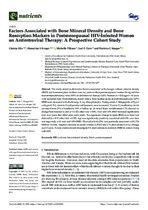Factors associated with bone mineral density and bone resorption markers in postmenopausal hiv-infected women on antiretroviral therapy: A prospective cohort study

View/
Date
2021Author
Ellis, Christa
Kruger, Herculina S
Viljoen, Michelle
Metadata
Show full item recordAbstract
The study aimed to determine factors associated with changes in bone mineral density
(BMD) and bone resorption markers over two years in black postmenopausal women living with human immunodeficiency virus (HIV) on antiretroviral therapy (ART). Women (n = 120) aged > 45 years
were recruited from Potchefstroom, South Africa. Total lumbar spine and left femoral neck (LFN)
BMD were measured with dual energy X-ray absorptiometry. Fasting serum C-Telopeptide of Type I
collagen (CTx), vitamin D and parathyroid hormone were measured. Vitamin D insufficiency levels
increased from 23% at baseline to 39% at follow up. In mixed linear models serum CTx showed no
change from baseline to end (p = 0.363, effect size = 0.09). Total and LFN BMD increased significantly
over two years, but effect sizes were small. No significant change in spine BMD over time was
detected (p = 0.19, effect size = 0.02). Age was significantly positively associated with CTx over time,
and negatively with total and LFN BMD. Physical activity (PA) was positively associated with LFN
BMD (p = 0.008). Despite a decrease in serum vitamin D, BMD and CTx showed small or no changes
over 2 years. Future studies should investigate PA interventions to maintain BMD in women living
with HIV.
